Deck 16: Population Ecology
Question
Question
Question
Question
Question
Question
Question
Question
Question
Question
Question
Question
Question
Question
Question
Question
Question
Question
Question
Question
Question
Question
Question
Question
Question
Question
Question
Question
Question
Question
Question
Question
Question
Question
Question
Question
Question
Question
Question
Question
Question
Question
Question
Question
Question
Question
Question
Question
Question
Question
Question
Question
Question
Question
Question
Question
Question
Question
Question
Question
Question
Question
Question
Match between columns
Question
Match between columns
Question
Question
Question
Match between columns
Question
Match between columns
Question
Question
Question
Match between columns
Question
Question
Match between columns
Question
Question
Question
Match between columns
Question
Question
Match between columns
Question
Match between columns
Question
Match between columns

Unlock Deck
Sign up to unlock the cards in this deck!
Unlock Deck
Unlock Deck
1/100
Play
Full screen (f)
Deck 16: Population Ecology
1
In which type of population distribution would plot sampling be most accurate?
A)clumping
B)uniform
C)random
D)random and clumping
E)uniform and clumping
A)clumping
B)uniform
C)random
D)random and clumping
E)uniform and clumping
B
2
Which statement describes Canada geese populations?
A)all Canada geese populations migrate
B)all Canada geese breed where they were raised
C)like other migratory birds, Canada geese are protected by federal law
D)when living together, migratory Canada geese do not interbreed with nonmigratory individuals
E)nonmigratory Canada geese have more goslings (baby geese)than migratory geese
A)all Canada geese populations migrate
B)all Canada geese breed where they were raised
C)like other migratory birds, Canada geese are protected by federal law
D)when living together, migratory Canada geese do not interbreed with nonmigratory individuals
E)nonmigratory Canada geese have more goslings (baby geese)than migratory geese
E
3
The study of interactions among organisms and between organisms and their environment is known as ____.
A)environmentalism
B)demography
C)ecology
D)biogeography
E)paleontology
A)environmentalism
B)demography
C)ecology
D)biogeography
E)paleontology
C
4
If the death rate of a population exceeds the birth rate of a population, ____.
A)the growth rate will remain static
B)the population will grow
C)the environment will become overexploited
D)an exponential growth curve will result
E)the population will decrease in size
A)the growth rate will remain static
B)the population will grow
C)the environment will become overexploited
D)an exponential growth curve will result
E)the population will decrease in size

Unlock Deck
Unlock for access to all 100 flashcards in this deck.
Unlock Deck
k this deck
5
Which group describes a population?
A)members of a population are all genetically identical
B)members of a population live together and interbreed
C)a population may include both predators and prey
D)members of a population spend much of their time living apart
E)members of a population can live in two geographic areas
A)members of a population are all genetically identical
B)members of a population live together and interbreed
C)a population may include both predators and prey
D)members of a population spend much of their time living apart
E)members of a population can live in two geographic areas

Unlock Deck
Unlock for access to all 100 flashcards in this deck.
Unlock Deck
k this deck
6
The most common type of population distribution is ____.
A)clumped
B)uniform
C)random
D)near-uniform
E)semi-random
A)clumped
B)uniform
C)random
D)near-uniform
E)semi-random

Unlock Deck
Unlock for access to all 100 flashcards in this deck.
Unlock Deck
k this deck
7
The number of individuals that make up a population's gene pool is the ____.
A)population distribution
B)population growth
C)population birth rate
D)population size
E)carrying capacity
A)population distribution
B)population growth
C)population birth rate
D)population size
E)carrying capacity

Unlock Deck
Unlock for access to all 100 flashcards in this deck.
Unlock Deck
k this deck
8
The number of individuals of the same species in some specified area or volume of habitat is the ____.
A)population density
B)population growth
C)population birth rate
D)population size
E)carrying capacity
A)population density
B)population growth
C)population birth rate
D)population size
E)carrying capacity

Unlock Deck
Unlock for access to all 100 flashcards in this deck.
Unlock Deck
k this deck
9
The rapid increase in the population of Canada geese in the United States can be primarily attributed to ____.
A)an increase of crop predation
B)a decrease in avian diseases
C)the suspension of hunting geese for many years
D)an increase in wetlands
E)an increase in the number of nonmigratory geese
A)an increase of crop predation
B)a decrease in avian diseases
C)the suspension of hunting geese for many years
D)an increase in wetlands
E)an increase in the number of nonmigratory geese

Unlock Deck
Unlock for access to all 100 flashcards in this deck.
Unlock Deck
k this deck
10
Which term describes the vital statistics of a population?
A)ecostatistics
B)population ecology
C)demographics
D)biostatistics
E)community ecology
A)ecostatistics
B)population ecology
C)demographics
D)biostatistics
E)community ecology

Unlock Deck
Unlock for access to all 100 flashcards in this deck.
Unlock Deck
k this deck
11
A patchy distribution of an essential resource leads to a(n)____ population distribution.
A)clumped
B)random
C)uniform
D)exponential
E)logistic
A)clumped
B)random
C)uniform
D)exponential
E)logistic

Unlock Deck
Unlock for access to all 100 flashcards in this deck.
Unlock Deck
k this deck
12
A population ecologist is studying the demographics of American bison living on a grassland in North Dakota. She captures, marks, and releases 100 bison. Later, she recaptures 100 bison and discovers that 50 were previously marked and half of those marked are of reproductive age. What is the population ecologist's estimate of how many bison in the total population are of reproductive age?
A)200
B)50
C)100
D)20
E)10
A)200
B)50
C)100
D)20
E)10

Unlock Deck
Unlock for access to all 100 flashcards in this deck.
Unlock Deck
k this deck
13
To a person studying utilization of cage space for lions in a zoo, the most useful data would be expressed by the number of ____.
A)total lions
B)lions per square foot
C)lions per cage per room
D)cages per zoo
E)lions of each age
A)total lions
B)lions per square foot
C)lions per cage per room
D)cages per zoo
E)lions of each age

Unlock Deck
Unlock for access to all 100 flashcards in this deck.
Unlock Deck
k this deck
14
A near-uniform population distribution is the result of ____.
A)social interaction
B)competition for resources
C)chemical avoidance
D)contact inhibition
E)planning
A)social interaction
B)competition for resources
C)chemical avoidance
D)contact inhibition
E)planning

Unlock Deck
Unlock for access to all 100 flashcards in this deck.
Unlock Deck
k this deck
15
Many species of terns nest on the ground in seabird colonies. However, if nests are too close together, aggression will break out. This tends to produce a(n)____.
A)near-uniform population distribution
B)opportunity for predation
C)clumped population distribution
D)opportunity for exponential growth
E)random population distribution
A)near-uniform population distribution
B)opportunity for predation
C)clumped population distribution
D)opportunity for exponential growth
E)random population distribution

Unlock Deck
Unlock for access to all 100 flashcards in this deck.
Unlock Deck
k this deck
16
In a population of Asian elephants, the death rate equals the birth rate. This population ____.
A)has reached its biotic potential
B)is not growing
C)has not exceeded its carrying capacity
D)is experiencing exponential growth
E)is experiencing survivorship growth
A)has reached its biotic potential
B)is not growing
C)has not exceeded its carrying capacity
D)is experiencing exponential growth
E)is experiencing survivorship growth

Unlock Deck
Unlock for access to all 100 flashcards in this deck.
Unlock Deck
k this deck
17
A population that is growing exponentially in the absence of limiting factors can be illustrated by which shaped curve?
A)S-shaped
B)J-shaped
C)O-shaped
D)bimodal
E)skewed
A)S-shaped
B)J-shaped
C)O-shaped
D)bimodal
E)skewed

Unlock Deck
Unlock for access to all 100 flashcards in this deck.
Unlock Deck
k this deck
18
A group of organisms of the same species that live in a specific location is called a(n)____.
A)community
B)population
C)species
D)genus
E)biome
A)community
B)population
C)species
D)genus
E)biome

Unlock Deck
Unlock for access to all 100 flashcards in this deck.
Unlock Deck
k this deck
19
A population ecologist wants to estimate the size of a robin population. In an apple orchard, she captures 10 robins, marks them, and then releases them. She returns several weeks later and captures another 10 robins, of which 2 are robins she previously marked. The estimated population size of robins is ____.
A)50
B)15
C)10
D)200
E)20
A)50
B)15
C)10
D)200
E)20

Unlock Deck
Unlock for access to all 100 flashcards in this deck.
Unlock Deck
k this deck
20
Biotic potential ____.
A)can always be reached in the natural world
B)is independent of life history traits
C)is based on limited resources
D)would be indicated by an S-shaped curve
E)is a theoretical value based on conditions of unlimited resources
A)can always be reached in the natural world
B)is independent of life history traits
C)is based on limited resources
D)would be indicated by an S-shaped curve
E)is a theoretical value based on conditions of unlimited resources

Unlock Deck
Unlock for access to all 100 flashcards in this deck.
Unlock Deck
k this deck
21
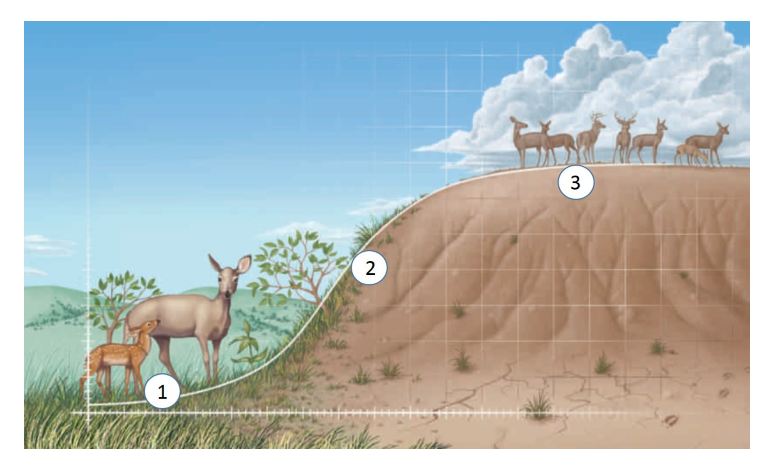
During phase "3" in the figure above, the population growth slows and then levels off because ____.
A)population growth becomes exponential
B)resources are virtually unlimited
C)density dependent factors stop playing an important role
D)density independent factors become operational
E)the carrying capacity has been reached

Unlock Deck
Unlock for access to all 100 flashcards in this deck.
Unlock Deck
k this deck
22
Rabbits were introduced to Australia in the 18th century. There were no other rabbits in Australia and there were no natural predators for the rabbits. It is likely that their population experienced ____.
A)per capita birth rate
B)logistic growth
C)exponential growth
D)sudden death
E)density independence
A)per capita birth rate
B)logistic growth
C)exponential growth
D)sudden death
E)density independence

Unlock Deck
Unlock for access to all 100 flashcards in this deck.
Unlock Deck
k this deck
23
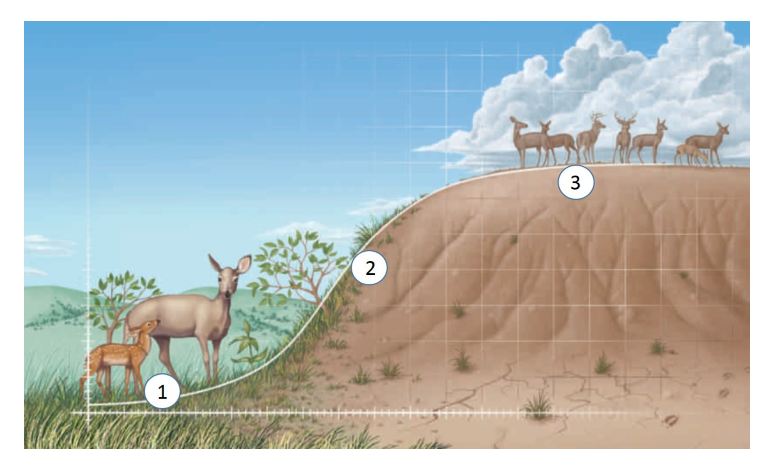
This figure describes a typical example of ____.
A)biotic potential growth
B)exponential growth
C)logistic growth
D)logarithmic growth
E)density-dependent growth

Unlock Deck
Unlock for access to all 100 flashcards in this deck.
Unlock Deck
k this deck
24
In general, population growth ____.
A)is limited by only one factor at a time
B)increases arithmetically
C)increases indefinitely
D)is limited by the carrying capacity
E)is represented by a minimum of two different sizes
A)is limited by only one factor at a time
B)increases arithmetically
C)increases indefinitely
D)is limited by the carrying capacity
E)is represented by a minimum of two different sizes

Unlock Deck
Unlock for access to all 100 flashcards in this deck.
Unlock Deck
k this deck
25
A J-shaped growth curve is converted to an S-shaped one ____.
A)when the parents are past reproductive age
B)if the data is plotted in reverse
C)when the carrying capacity is reached
D)if reproduction is stopped
E)only for fast-growing populations such as bacteria
A)when the parents are past reproductive age
B)if the data is plotted in reverse
C)when the carrying capacity is reached
D)if reproduction is stopped
E)only for fast-growing populations such as bacteria

Unlock Deck
Unlock for access to all 100 flashcards in this deck.
Unlock Deck
k this deck
26
On Easter Island in the Pacific Ocean, the population rose to 3000 people from the original population of 100. In time, the entire island was cultivated, and eventually, the soils became so over-cultivated that crops could no longer be grown. People started dying from starvation and disease. This Easter Island population had exceeded its ____.
A)density-independent factors
B)biotic potential
C)logistic growth
D)carrying capacity
E)opportunistic life history
A)density-independent factors
B)biotic potential
C)logistic growth
D)carrying capacity
E)opportunistic life history

Unlock Deck
Unlock for access to all 100 flashcards in this deck.
Unlock Deck
k this deck
27
A change in a population that is related strictly to its size is best described as ____.
A)density-dependent
B)density-independent
C)biotic
D)logistic
E)exponential
A)density-dependent
B)density-independent
C)biotic
D)logistic
E)exponential

Unlock Deck
Unlock for access to all 100 flashcards in this deck.
Unlock Deck
k this deck
28
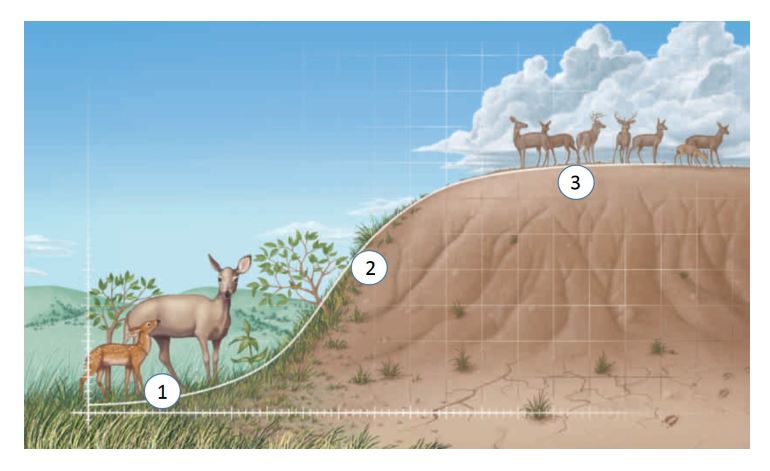
During phase "2" in the figure above, the growth is ____ as long as resources are plentiful.
A)logical
B)logistical
C)arithmetic
D)exponential
E)analytical

Unlock Deck
Unlock for access to all 100 flashcards in this deck.
Unlock Deck
k this deck
29
Limiting factors to population growth ____.
A)produce less pronounced effects as a population grows
B)tend to increase population growth
C)are the same as the biotic potential
D)raise the carrying capacity to a higher level
E)prevent a population from producing a J-shaped growth curve
A)produce less pronounced effects as a population grows
B)tend to increase population growth
C)are the same as the biotic potential
D)raise the carrying capacity to a higher level
E)prevent a population from producing a J-shaped growth curve

Unlock Deck
Unlock for access to all 100 flashcards in this deck.
Unlock Deck
k this deck
30
A cohort is ____.
A)a collection of same-aged individuals of the same species
B)any member of the same species
C)any member of the same species and sex within a population
D)a sexual mate
E)a litter mate or sibling within a large population
A)a collection of same-aged individuals of the same species
B)any member of the same species
C)any member of the same species and sex within a population
D)a sexual mate
E)a litter mate or sibling within a large population

Unlock Deck
Unlock for access to all 100 flashcards in this deck.
Unlock Deck
k this deck
31
Which growth model occurs when the amount of available resources is not limiting?
A)arithmetic growth
B)logistic growth
C)logarithmic growth
D)exponential growth
E)exponential growth and arithmetic growth
A)arithmetic growth
B)logistic growth
C)logarithmic growth
D)exponential growth
E)exponential growth and arithmetic growth

Unlock Deck
Unlock for access to all 100 flashcards in this deck.
Unlock Deck
k this deck
32
An epidemic facilitated by a high, dense population is an example of a(n)____ factor.
A)density-dependent
B)density-independent
C)biotic
D)logistic
E)exponential
A)density-dependent
B)density-independent
C)biotic
D)logistic
E)exponential

Unlock Deck
Unlock for access to all 100 flashcards in this deck.
Unlock Deck
k this deck
33
Which is a density-independent factor?
A)competition
B)predation
C)earthquakes
D)parasitism
E)disease
A)competition
B)predation
C)earthquakes
D)parasitism
E)disease

Unlock Deck
Unlock for access to all 100 flashcards in this deck.
Unlock Deck
k this deck
34
A flood that washes away an entire population of rabbits is a(n)____.
A)density-dependent factor
B)intrinsic limiting factor
C)density-independent factor
D)consequence of exponential growth
E)example of a population reaching its carrying capacity
A)density-dependent factor
B)intrinsic limiting factor
C)density-independent factor
D)consequence of exponential growth
E)example of a population reaching its carrying capacity

Unlock Deck
Unlock for access to all 100 flashcards in this deck.
Unlock Deck
k this deck
35
What is the major assumption of the exponential model of population growth?
A)resources are unlimited
B)organisms selectively choose their mates
C)the death rate equals the birth rate
D)biotic potential is limited
E)density-dependent factors are at work
A)resources are unlimited
B)organisms selectively choose their mates
C)the death rate equals the birth rate
D)biotic potential is limited
E)density-dependent factors are at work

Unlock Deck
Unlock for access to all 100 flashcards in this deck.
Unlock Deck
k this deck
36
The maximum number of individuals of a species that a given environment can sustain indefinitely defines ____.
A)the carrying capacity of the environment
B)exponential growth
C)the doubling time of a population
D)density-independent factors
E)density independent factors
A)the carrying capacity of the environment
B)exponential growth
C)the doubling time of a population
D)density-independent factors
E)density independent factors

Unlock Deck
Unlock for access to all 100 flashcards in this deck.
Unlock Deck
k this deck
37
Which element is a density-dependent factor that controls the size of a population?
A)wind velocity
B)light intensity
C)resource availability
D)temperature
E)wave action in an intertidal zone
A)wind velocity
B)light intensity
C)resource availability
D)temperature
E)wave action in an intertidal zone

Unlock Deck
Unlock for access to all 100 flashcards in this deck.
Unlock Deck
k this deck
38
Density-independent controls over population growth include ____.
A)parasites
B)temperature
C)disease
D)competition
E)predation
A)parasites
B)temperature
C)disease
D)competition
E)predation

Unlock Deck
Unlock for access to all 100 flashcards in this deck.
Unlock Deck
k this deck
39
Typically, members of a cohort are tracked ____.
A)until they become independent
B)until their breeding age
C)for a period of time and then released in the environment to serve their purpose in the community
D)from birth to death
E)as long as they are in good health and serve the purpose of a study
A)until they become independent
B)until their breeding age
C)for a period of time and then released in the environment to serve their purpose in the community
D)from birth to death
E)as long as they are in good health and serve the purpose of a study

Unlock Deck
Unlock for access to all 100 flashcards in this deck.
Unlock Deck
k this deck
40
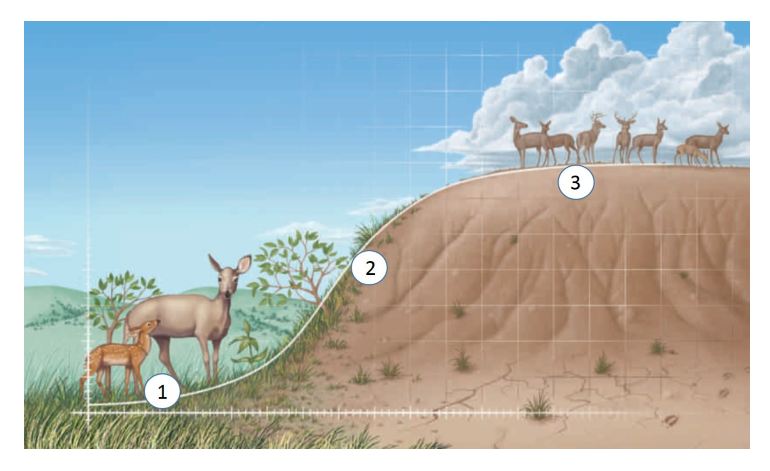
During phase "1" in the figure above, the size of the deer population grows slowly because ____.
A)predators eat fawns as they are born
B)the number of breeding individuals is small
C)the temperatures are relatively extreme
D)the amount of food available is relatively scarce
E)fawns are subject to disease

Unlock Deck
Unlock for access to all 100 flashcards in this deck.
Unlock Deck
k this deck
41
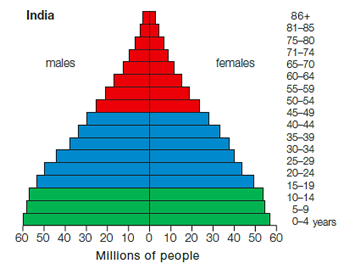
From this age structure diagram for India, it is likely that India's population will ____.
A)crash
B)have a larger proportion of older individuals
C)remain stable
D)decrease
E)increase

Unlock Deck
Unlock for access to all 100 flashcards in this deck.
Unlock Deck
k this deck
42
Which type of survivorship curve is pictured here for Dall sheep?
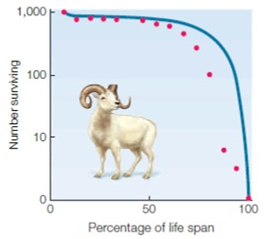
A)type II
B)logistic
C)type I
D)exponential
E)type III

A)type II
B)logistic
C)type I
D)exponential
E)type III

Unlock Deck
Unlock for access to all 100 flashcards in this deck.
Unlock Deck
k this deck
43
Refer to the following figure for questions 53, 54, and 55.
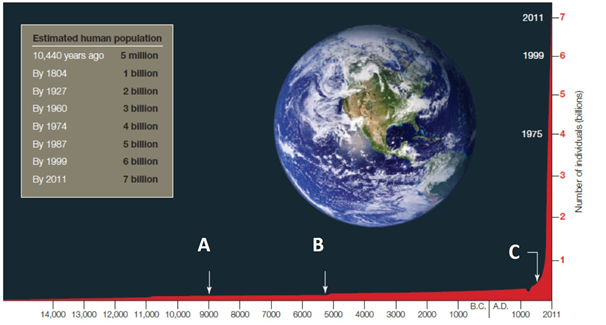
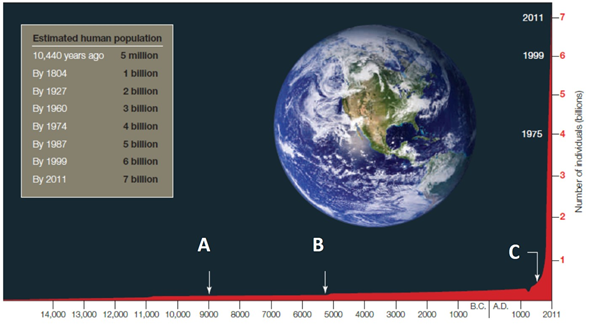
Letter "A" designates the ____, which provided for a more reliable food supply approximately 11,000 years ago.
A)Bubonic plague
B)domestication of plants and animals
C)industrial and scientific revolutions
D)discovery of America
E)emergence of agriculturally based urban societies


Letter "A" designates the ____, which provided for a more reliable food supply approximately 11,000 years ago.
A)Bubonic plague
B)domestication of plants and animals
C)industrial and scientific revolutions
D)discovery of America
E)emergence of agriculturally based urban societies

Unlock Deck
Unlock for access to all 100 flashcards in this deck.
Unlock Deck
k this deck
44
Refer to the following figure for questions 53, 54, and 55.
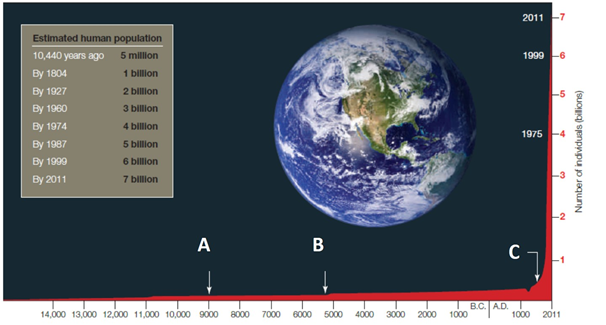
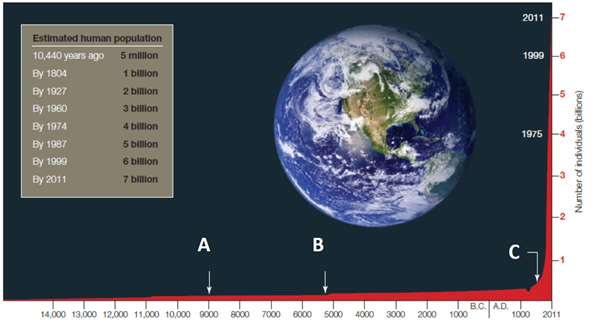
The steep increase in human population at point "C" indicates the beginning of the ____.
A)Bubonic plague
B)domestication of plants and animals
C)industrial and scientific revolutions
D)discovery of America
E)emergence of agriculturally based urban societies


The steep increase in human population at point "C" indicates the beginning of the ____.
A)Bubonic plague
B)domestication of plants and animals
C)industrial and scientific revolutions
D)discovery of America
E)emergence of agriculturally based urban societies

Unlock Deck
Unlock for access to all 100 flashcards in this deck.
Unlock Deck
k this deck
45
A study of a cohort of 1,000 newborn animals showed a death rate of 40% per individual in year one and a death rate of 80% per individual in year two. The quantity of survivors after two years is about ____.
A)120
B)200
C)320
D)400
E)1,000
A)120
B)200
C)320
D)400
E)1,000

Unlock Deck
Unlock for access to all 100 flashcards in this deck.
Unlock Deck
k this deck
46
The age-structure diagram for rapidly growing populations ____.
A)is in the form of a rectangle
B)is characterized by a large percentage of the population in the post-reproductive years
C)has a very narrow base, showing a small number of young
D)has about equal distribution among all age groups
E)is in the form of a pyramid with a very broad base indicating a large number of young
A)is in the form of a rectangle
B)is characterized by a large percentage of the population in the post-reproductive years
C)has a very narrow base, showing a small number of young
D)has about equal distribution among all age groups
E)is in the form of a pyramid with a very broad base indicating a large number of young

Unlock Deck
Unlock for access to all 100 flashcards in this deck.
Unlock Deck
k this deck
47
A type III survivorship curve is characteristic of ____.
A)dogs
B)goats
C)hawks
D)clams
E)horses
A)dogs
B)goats
C)hawks
D)clams
E)horses

Unlock Deck
Unlock for access to all 100 flashcards in this deck.
Unlock Deck
k this deck
48
Type II survivorship curves ____.
A)are characteristics of humans and elephants
B)typify a population in which all ages have an equal chance of survival
C)indicate a high mortality rate in the very young
D)show that very few young are produced, that each is given parental support, and that most individuals live a relatively long life and die of old age
E)are typical of annual plants
A)are characteristics of humans and elephants
B)typify a population in which all ages have an equal chance of survival
C)indicate a high mortality rate in the very young
D)show that very few young are produced, that each is given parental support, and that most individuals live a relatively long life and die of old age
E)are typical of annual plants

Unlock Deck
Unlock for access to all 100 flashcards in this deck.
Unlock Deck
k this deck
49
E. coli is an intestinal bacterium that reproduces every 20 minutes. E. coli is representative of a(n)____ species.
A)r-selected
B)k-selected
C)type I
D)logarithmic type-curve
E)type IV
A)r-selected
B)k-selected
C)type I
D)logarithmic type-curve
E)type IV

Unlock Deck
Unlock for access to all 100 flashcards in this deck.
Unlock Deck
k this deck
50
Type I survivorship curves are typical of ____.
A)horses only
B)chimpanzees only
C)mice only
D)horses and chimpanzees
E)horses, chimpanzees, and mice
A)horses only
B)chimpanzees only
C)mice only
D)horses and chimpanzees
E)horses, chimpanzees, and mice

Unlock Deck
Unlock for access to all 100 flashcards in this deck.
Unlock Deck
k this deck
51
Type I survivorship curves ____.
A)are characteristics of mice and other rodents
B)typify a population in which all ages have an equal chance of survival
C)indicate a high mortality rate in the very young
D)show that very few young are produced, that each is given parental support, and that most individuals live a relatively long life and die of old age
E)are typical of annual plants
A)are characteristics of mice and other rodents
B)typify a population in which all ages have an equal chance of survival
C)indicate a high mortality rate in the very young
D)show that very few young are produced, that each is given parental support, and that most individuals live a relatively long life and die of old age
E)are typical of annual plants

Unlock Deck
Unlock for access to all 100 flashcards in this deck.
Unlock Deck
k this deck
52
Which type of growth curve is pictured for the accompanying photo of a desert shrub?
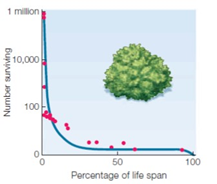
A)type II
B)logistic
C)type I
D)exponential
E)type III

A)type II
B)logistic
C)type I
D)exponential
E)type III

Unlock Deck
Unlock for access to all 100 flashcards in this deck.
Unlock Deck
k this deck
53
In which demographic model is population growth the fastest?
A)pre-industrial
B)transitional
C)industrial
D)postindustrial
E)transformational
A)pre-industrial
B)transitional
C)industrial
D)postindustrial
E)transformational

Unlock Deck
Unlock for access to all 100 flashcards in this deck.
Unlock Deck
k this deck
54
Which important discovery in the early 1900s enhanced food production, thus increasing human population growth?
A)cultivation of rice
B)cultivation of wheat
C)the wheel
D)synthetic fertilizer
E)penicillin
A)cultivation of rice
B)cultivation of wheat
C)the wheel
D)synthetic fertilizer
E)penicillin

Unlock Deck
Unlock for access to all 100 flashcards in this deck.
Unlock Deck
k this deck
55
Refer to the following figure for questions 53, 54, and 55.
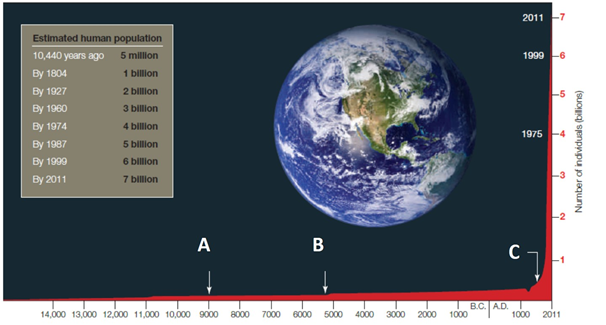
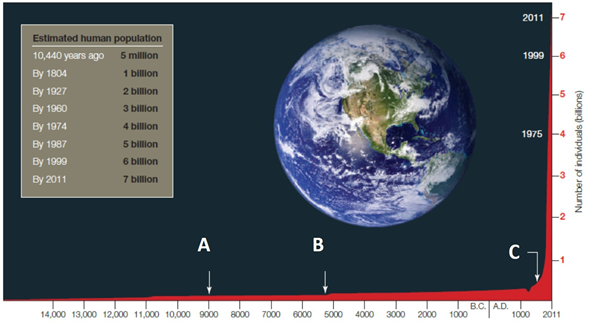
Letter "B" designates the ____, which allowed for an increase in human population growth.
A)Bubonic plague
B)domestication of plants and animals
C)industrial and scientific revolutions
D)discovery of America
E)emergence of agriculturally based urban societies


Letter "B" designates the ____, which allowed for an increase in human population growth.
A)Bubonic plague
B)domestication of plants and animals
C)industrial and scientific revolutions
D)discovery of America
E)emergence of agriculturally based urban societies

Unlock Deck
Unlock for access to all 100 flashcards in this deck.
Unlock Deck
k this deck
56
A house mouse has a(n)____.
A)type II population curve
B)k-selected life history
C)type I population curve
D)opportunistic life history
E)equilibrial life history
A)type II population curve
B)k-selected life history
C)type I population curve
D)opportunistic life history
E)equilibrial life history

Unlock Deck
Unlock for access to all 100 flashcards in this deck.
Unlock Deck
k this deck
57
If reproduction occurs early in the life cycle, ____.
A)population growth rate increases
B)population size declines
C)population size is not affected
D)generation time increases
E)growth rate remains unchanged
A)population growth rate increases
B)population size declines
C)population size is not affected
D)generation time increases
E)growth rate remains unchanged

Unlock Deck
Unlock for access to all 100 flashcards in this deck.
Unlock Deck
k this deck
58
Sea lions can live into their thirties and produce no more than one pup per year. A sea lion is a(n)____ species.
A)type II
B)opportunistic
C)K-selected
D)r-selected
E)type III
A)type II
B)opportunistic
C)K-selected
D)r-selected
E)type III

Unlock Deck
Unlock for access to all 100 flashcards in this deck.
Unlock Deck
k this deck
59
Killifish preferentially prey upon small, young guppies. This leads to selective pressure for the guppy population to ____.
A)evolve an equilibrial life history
B)learn to evade predators while young
C)reduce the number of offspring
D)put energy into growth rather than reproduction
E)put energy into reproduction rather than growth
A)evolve an equilibrial life history
B)learn to evade predators while young
C)reduce the number of offspring
D)put energy into growth rather than reproduction
E)put energy into reproduction rather than growth

Unlock Deck
Unlock for access to all 100 flashcards in this deck.
Unlock Deck
k this deck
60
The most sustainable method for limiting human population growth is ____.
A)decreasing birth rate
B)increasing carrying capacity
C)decreasing competition
D)increasing death rate
E)exploiting outer space
A)decreasing birth rate
B)increasing carrying capacity
C)decreasing competition
D)increasing death rate
E)exploiting outer space

Unlock Deck
Unlock for access to all 100 flashcards in this deck.
Unlock Deck
k this deck
61
It has been estimated that if everyone in the world had the same lifestyle as the average American, it would require ____ more Earths.
A)one
B)two
C)three
D)four
E)five
A)one
B)two
C)three
D)four
E)five

Unlock Deck
Unlock for access to all 100 flashcards in this deck.
Unlock Deck
k this deck
62
The highest number of individuals in the United States are in the ____ age structure category.
A)pre-reproductive
B)early reproductive
C)late reproductive
D)early post-reproductive
E)late post-reproductive
A)pre-reproductive
B)early reproductive
C)late reproductive
D)early post-reproductive
E)late post-reproductive

Unlock Deck
Unlock for access to all 100 flashcards in this deck.
Unlock Deck
k this deck
63
Match between columns

Unlock Deck
Unlock for access to all 100 flashcards in this deck.
Unlock Deck
k this deck
64
Match between columns

Unlock Deck
Unlock for access to all 100 flashcards in this deck.
Unlock Deck
k this deck
65
Resource consumption tends to ____ with economic and industrial development.
A)remain balanced
B)decrease
C)remain stable
D)rise
E)keep pace
A)remain balanced
B)decrease
C)remain stable
D)rise
E)keep pace

Unlock Deck
Unlock for access to all 100 flashcards in this deck.
Unlock Deck
k this deck
66
What invention about 11,000 years ago led to a boom in the human population?
A)the wheel
B)agriculture
C)the printing press
D)the steam engine
E)the written language
A)the wheel
B)agriculture
C)the printing press
D)the steam engine
E)the written language

Unlock Deck
Unlock for access to all 100 flashcards in this deck.
Unlock Deck
k this deck
67
Match between columns

Unlock Deck
Unlock for access to all 100 flashcards in this deck.
Unlock Deck
k this deck
68
Match between columns

Unlock Deck
Unlock for access to all 100 flashcards in this deck.
Unlock Deck
k this deck
69
India is in which demographic transitional stage?
A)birth and death rates equally high; growth rate low
B)death rate dropping fast; birth rate declining but slowly
C)birth rates declining and approaching the death rates
D)birth rate falling below death rate; population size decreasing
E)death rate greatly exceeds birth rate; population is close to extinction
A)birth and death rates equally high; growth rate low
B)death rate dropping fast; birth rate declining but slowly
C)birth rates declining and approaching the death rates
D)birth rate falling below death rate; population size decreasing
E)death rate greatly exceeds birth rate; population is close to extinction

Unlock Deck
Unlock for access to all 100 flashcards in this deck.
Unlock Deck
k this deck
70
In India, which age structure category holds the least number of individuals?
A)pre-reproductive
B)early reproductive
C)late reproductive
D)early post-reproductive
E)late post-reproductive
A)pre-reproductive
B)early reproductive
C)late reproductive
D)early post-reproductive
E)late post-reproductive

Unlock Deck
Unlock for access to all 100 flashcards in this deck.
Unlock Deck
k this deck
71
Match between columns

Unlock Deck
Unlock for access to all 100 flashcards in this deck.
Unlock Deck
k this deck
72
How much of Europe's population was wiped out by the Black Death?
A)1/2
B)1/3
C)1/4
D)1/5
E)1/6
A)1/2
B)1/3
C)1/4
D)1/5
E)1/6

Unlock Deck
Unlock for access to all 100 flashcards in this deck.
Unlock Deck
k this deck
73
Match between columns

Unlock Deck
Unlock for access to all 100 flashcards in this deck.
Unlock Deck
k this deck
74
Which country has the smallest ecological footprint?
A)Mexico
B)China
C)United States
D)India
E)Canada
A)Mexico
B)China
C)United States
D)India
E)Canada

Unlock Deck
Unlock for access to all 100 flashcards in this deck.
Unlock Deck
k this deck
75
Which country has the biggest ecological footprint?
A)France
B)United States
C)China
D)India
E)Canada
A)France
B)United States
C)China
D)India
E)Canada

Unlock Deck
Unlock for access to all 100 flashcards in this deck.
Unlock Deck
k this deck
76
Match between columns

Unlock Deck
Unlock for access to all 100 flashcards in this deck.
Unlock Deck
k this deck
77
The countries of ____ and ____ have the world's highest human populations.
A)India; China
B)China; United States
C)China; Brazil
D)India; United States
E)United States; Canada
A)India; China
B)China; United States
C)China; Brazil
D)India; United States
E)United States; Canada

Unlock Deck
Unlock for access to all 100 flashcards in this deck.
Unlock Deck
k this deck
78
Match between columns

Unlock Deck
Unlock for access to all 100 flashcards in this deck.
Unlock Deck
k this deck
79
Match between columns

Unlock Deck
Unlock for access to all 100 flashcards in this deck.
Unlock Deck
k this deck
80
Match between columns

Unlock Deck
Unlock for access to all 100 flashcards in this deck.
Unlock Deck
k this deck


